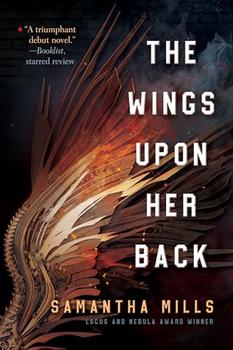Summary | Excerpt | Reviews | Beyond the Book | Readalikes | Genres & Themes | Author Bio

Excerpt
The Wings Upon Her Back
There is a question which has preoccupied me for many years:
What is Radezhda?
I can already hear your complaints. Why, it is a city, of course! In that case, I ask you: what is a city?
Creator Stasia wrote that a city is a related network of roads. But this cannot be true. Some of our roads extend clear through the mountains, and we do not claim all the land alongside them there, nor the municipalities where they continue on the other side. This is clearly the musing of an engineer—I built it, therefore it is mine.
Is a city a cluster of homes, then? This answer seems satisfactory when considering an isolated community such as ours, but there are many more cities in the world which neatly abut one another. We find ourselves in the same situation as we were with the roads—where to call an end to it? We include the farmers in our cityhood, and they do not even reside within the city walls.
Borders, then! That is the purpose of borders. To mutually decide upon a limit, and inscribe it upon a map. To you, the homes in the foothills; to you, everything west of the river ... Except those borders did not spring from nothing! This is a warrior's answer, a fixation on protecting what is already there without asking how it came to be.
A city, according to the workers within it, is a designation of where one's taxes go and from where one's benefits derive. Industry and government. Centralized economy. This is, by far, the most practical answer. But much like borders, homes, and roads—it only describes a single moment in time. Tomorrow, entire neighborhoods may be traded, abandoned, absorbed.
When I ask, "What is Radezhda?" I do not mean which is the last property beholden to the Council of Five in this year in particular. I am asking: what unites us? What defines us? What is our purpose?
A city is ever-changing, a timeline of expansions and contractions, technological advances and social evolution—and so I have no choice but to conclude that a city is its history.
Just as generations of family remain linked long after their forebears are dead, a city is united by a sense of community, culture, the acknowledgment that our current existence is the result of ten thousand decisions made before us. For newcomers it is a self-identification—an active choice to join the lineage of a new family.
A city is a place that knows the truth of itself. A city is a story.
And the story of Radezhda is a strange one.
Consider this:
In the beginning, there was a city of stone and sod, a people of humble means, a home in a valley of no consequence. And then the gods came.
What was Radezhda before the gods? It was not even called Radezhda—not until the attempted invasion by Rava State, and the death of the first saint, bless her memory. It was hardly even a city, not in any of the senses defined above. It was a disparate group of families scattered through a quiet valley nestled against the mountains Kelior. They farmed with stone tools. They lived in houses of wood and sod. Only much later, looking back, did we say: ah, that is where the city began.
Imagine this life. Imagine their wonder, when the sky filled with god-light, and those incomprehensible voices spoke for the first time. Five of them, each with their own preoccupation, each with their own set of gifts.
Imagine it.
Little remains from those early days. We have fragments of the Dierka Mountain Scrolls. Hints and whispers from the past—they were afraid, then they were not. They were dazzled by all of the Five, then they began to align themselves according to each god's teachings.
This we know beyond doubt:
The creator god required their followers to explore and innovate, for without engineers, there could be no progress.
Excerpted from The Wings Upon Her Back by Samantha Mills. Copyright © 2024 by Samantha Mills. Excerpted by permission of Tachyon Publications. All rights reserved. No part of this excerpt may be reproduced or reprinted without permission in writing from the publisher.
Your guide toexceptional books
BookBrowse seeks out and recommends the best in contemporary fiction and nonfiction—books that not only engage and entertain but also deepen our understanding of ourselves and the world around us.